After you’ve picked your elderflowers, it’s time to make some gorgeous drinks with them. Give them a good look over, and sort through. Throw out any browning flowers. Shake out any bugs but do not be tempted to wash them – you’ll wash all the flavour away! You’ll be straining the ‘bits’ out later anyway, so don’t worry about the odd aphid making it through!
These are the ingredients and equipment you’ll need for the elderflower cordial. You can scale these quantities up or down to suit yourself, but when I’ve gone to the effort of harvesting the flowers I can’t see the point in making much less than this at a time. –
- About 70 nice elderflowers
- 6lb (2.7kg) of un-refined ‘golden’ granulated or caster sugar
- 6 UK pints (3.4l) of boiling water
- 4 lemons (ideally unwaxed, failing that washed carefully in detergent & rinsed)
- 4 oranges (likewise)
- 4oz / 100g of citric acid (get this from a home-brew supplier, or a chemist’s)
- Large stainless steel pan or food-grade plastic bucket big enough to hold all the ingredients (if you have a second one of these, this will also come in useful), with lid
- Jug, jelly bag / fine strainer and muslin
- Enough bottles to hold your cordial – I use recycled screw-top wine bottles, plastic bottles are also fine and you can freeze cordial in them.
- Campden tablets / powder (optional – if you’re a wine-maker you probably have these anyway – they’ll allow you to store your cordial for long periods at room temperature, which is very useful!)
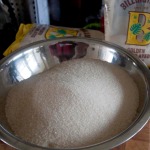 Weigh out all your sugar – I know there’s a lot of it, on the plus side you’ll be drinking this watered down so it’s not quite as bad as it looks (hey, who am I kidding?). I’ve seen it asserted you can make this with ‘Splenda’ rather than sugar if you insist, but I haven’t tried it so can’t vouch for the results!
Weigh out all your sugar – I know there’s a lot of it, on the plus side you’ll be drinking this watered down so it’s not quite as bad as it looks (hey, who am I kidding?). I’ve seen it asserted you can make this with ‘Splenda’ rather than sugar if you insist, but I haven’t tried it so can’t vouch for the results!
Dissolve your sugar in the boiling water, and add the citric acid. Stir until it’s all fully dissolved. Now wait until it’s cooled down (immersing your pan or bucket carefully in a sink full of cold water can speed this process up greatly).
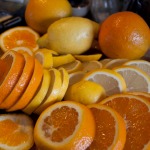 Slice up your citrus fruit into thick slices (about 1cm thick), and add these to the cool sugar syrup. Then add the elderflowers, one at a time so you can give them a good shake to dislodge any debris or creepy crawlies and discard any substandard flowers.
Slice up your citrus fruit into thick slices (about 1cm thick), and add these to the cool sugar syrup. Then add the elderflowers, one at a time so you can give them a good shake to dislodge any debris or creepy crawlies and discard any substandard flowers.
The smell will be amazing. Steep for two or three days, covered, at room temperature.
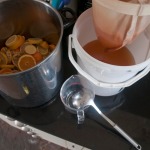 Once all the flavours have infused, it’s time to strain and bottle. First, strain the cordial through the jelly bag or sieve lined with a layer of muslin. I was about to discard the fruit with the elderflowers but couldn’t bring myself to do it – instead, I made a batch of ‘accidental’ marmalade, which is really very good!
Once all the flavours have infused, it’s time to strain and bottle. First, strain the cordial through the jelly bag or sieve lined with a layer of muslin. I was about to discard the fruit with the elderflowers but couldn’t bring myself to do it – instead, I made a batch of ‘accidental’ marmalade, which is really very good!
Check your volume, then crush and add your campden (if using) at the doseage given on the pack – usually 1 tablet per gallon. For me, the ingredients yielded just over a gallon (or 4.5l) of cordial, which was convenient for bottles, at a smidgen over six full wine bottles worth.
Stir well to dissolve, then allow your strained cordial to settle for at least 3 – 4 hours (or overnight) so that some of the sediment that’s survived the filtering – this will mostly be pollen, which is very small – will settle to the bottom of the bucket. If you use a good fine jelly bag, there’ll be very little sediment to worry about.
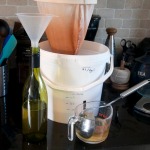 Sterilise your bottles using home-brew steriliser (or in the oven like jam jars, but if so make sure you let them cool completely before filling – cold liquid into hot bottles is a recipe for disaster!). Then fill them using a jug & funnel – you could use a syphon, and this might reduce your sediment a little, but it seems a lot of faff to me!
Sterilise your bottles using home-brew steriliser (or in the oven like jam jars, but if so make sure you let them cool completely before filling – cold liquid into hot bottles is a recipe for disaster!). Then fill them using a jug & funnel – you could use a syphon, and this might reduce your sediment a little, but it seems a lot of faff to me!
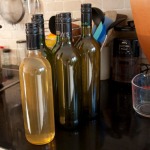 With campden, the bottles should store for a long while at room temperature (at least until next year’s elderflowers are ready – though I challenge you to save any that long!). Without, they should keep in the fridge for a month or two, without refrigeration, there’s a significant risk that they start to ferment! If you’re using plastic bottles, you can always stash them in the bottom of the deep freeze – they’ll keep for ages like that.
With campden, the bottles should store for a long while at room temperature (at least until next year’s elderflowers are ready – though I challenge you to save any that long!). Without, they should keep in the fridge for a month or two, without refrigeration, there’s a significant risk that they start to ferment! If you’re using plastic bottles, you can always stash them in the bottom of the deep freeze – they’ll keep for ages like that.
It looks lovely in a clear glass bottle, like fresh bottled sunshine (and we’ve had precious little of that this year!). My favourite way to enjoy this cordial is with plenty of ice, a slice of lemon or lime, and sparkling water, in a tall glass on a hot summer’s afternoon. But I also cherish it as an amazing taste of summer to remind you of the warmer, brighter days in the depths of a cold damp dark winter!
Read more from the Country Skills blog >>

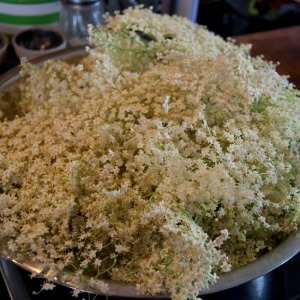
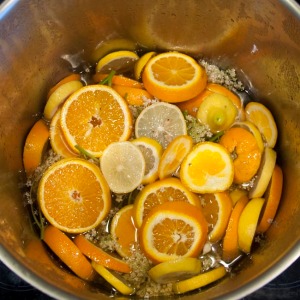
Pingback: Last of the Harvest – elderflower ‘champagne’ | Country Skills for Modern Life
Pingback: Last of the Harvest – finally foraged the elderflowers! | Country Skills for Modern Life
Pingback: Last of the Harvest – finally foraged the elderflowers! | Country Skills for Modern Life
Do you not pick out the yellow bits to reduce the wee-ey-ness? That’s always way too much faff for me, but people who’ve taught me have always said you should. Does it add to the taste? Maybe it does in your filtering? I’ve never tasted it with the yellow bits left on and have always wondered if it actually tasted as bad as folk said if you didn’t bother.
No, I never have, and it tastes marvellous to me! And no one I’ve fed it to has ever complained, but perhaps they’re too polite!
I may well assume that emperor has no clothes then, :-).
Pingback: Last of the Harvest – bonus ‘accidental’ elderflower-infused marmalade | Country Skills for Modern Life
Pingback: Elderflorescence – it’s not too late for elderflower cordial, champagne, and how about vinegar? | Country Skills for Modern Life
Pingback: April Showers Bring May Flowers | Country Skills for Modern Life
Pingback: Elderflower Vinegar, From the Forager’s Kitchen by Fiona Bird – Cooking the Books, Week 22 | Country Skills for Modern Life
Pingback: A Summer Fling – my new favourite gin, apple and elderflower cocktail | Country Skills for Modern Life